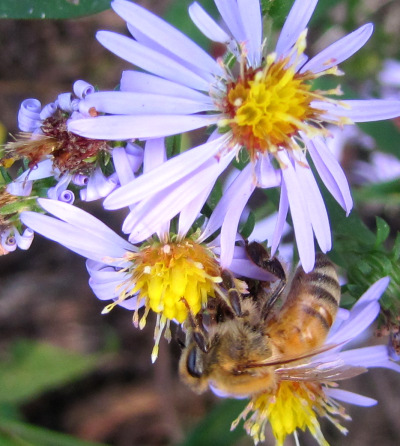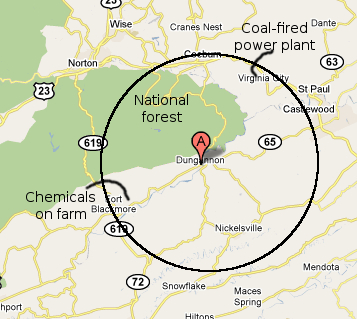
Guidelines for natural beekeeping
 Ross
Conrad's theory of natural beekeeping can be summed up as focusing on a
strong, healthy colony rather than on maximum honey output. That
means leaving 60 to 80 pounds of honey on the hive to get them through
his Vermont winters and feeding only in emergencies. If he does
have to feed, he tries to feed honey, then falls back on white sugar.
Ross
Conrad's theory of natural beekeeping can be summed up as focusing on a
strong, healthy colony rather than on maximum honey output. That
means leaving 60 to 80 pounds of honey on the hive to get them through
his Vermont winters and feeding only in emergencies. If he does
have to feed, he tries to feed honey, then falls back on white sugar.
Conrad also believes
that natural beekeepers should aim for genetic diversity and try to
build up hives adapted to our local area. We should let our bees
requeen rather than killing our queen every year or two and ordering a
new one. If you do have to buy a queen, he recommends finding her
locally rather than shipping in bees from across the country which are
adapted to very different climates.
 Finally,
he points out that you need to consider an area up to 17 miles in
diameter when keeping your bees happy and healthy. In regular
conditions, studies have shown that about 10% of worker bees fly up to
5.5 miles in search of distant nectar and pollen sources, and that they
may fly as much as 8.5 miles when feed is scarce. So the organic
paradise we offer our bees may be offset by the coal-fired power plant
eight miles away and by the pesticides and herbicides used on the large
strawberry and tomato farm a similar distance in the other
direction. As beekeepers, our work is cut out for us keeping our
far-ranging livestock healthy.
Finally,
he points out that you need to consider an area up to 17 miles in
diameter when keeping your bees happy and healthy. In regular
conditions, studies have shown that about 10% of worker bees fly up to
5.5 miles in search of distant nectar and pollen sources, and that they
may fly as much as 8.5 miles when feed is scarce. So the organic
paradise we offer our bees may be offset by the coal-fired power plant
eight miles away and by the pesticides and herbicides used on the large
strawberry and tomato farm a similar distance in the other
direction. As beekeepers, our work is cut out for us keeping our
far-ranging livestock healthy.
| This post is part of our Natural Beekeeping lunchtime series.
Read all of the entries: |
Want more in-depth information? Browse through our books.
Or explore more posts by date or by subject.
About us: Anna Hess and Mark Hamilton spent over a decade living self-sufficiently in the mountains of Virginia before moving north to start over from scratch in the foothills of Ohio. They've experimented with permaculture, no-till gardening, trailersteading, home-based microbusinesses and much more, writing about their adventures in both blogs and books.
Want to be notified when new comments are posted on this page? Click on the RSS button after you add a comment to subscribe to the comment feed, or simply check the box beside "email replies to me" while writing your comment.

But now I know which county you're in! I had been wondering but it felt weird to ask. I didn't want you to think I was a stalker or anything. It only matters because I'm in Bristol TN, if I was in, say, Vermont, I wouldn't care and you wouldn't care if I knew!
So... Hi. My name is Emily. I'm the Nature Center Assistant at Steele Creek Park. I noticed your name in a lot of our books, and on the cover of the Weekend Homesteader (which I devoured, by the way, and I think it was your mom who told me the best crop for my 2 x 6 porch was blueberries in pots, so now I have two). At any rate, thats how i found out about your blog, and every spare moment I have had in the past week has been spent reading your archives. I read a few homesteading and gardening blogs, but you are so close! Now i can read about what works for this area, as opposed to Seattle or Denver.
Anyways, nice to meet you!